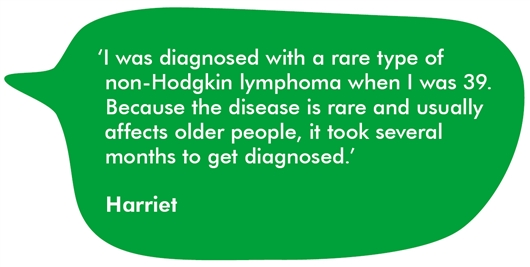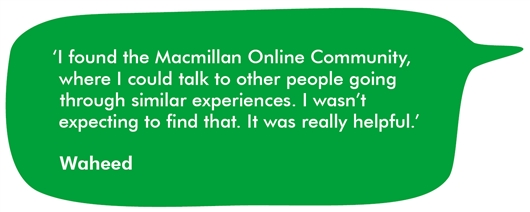February 28th is Rare Disease Day. It aims to raise awareness about rare diseases, including rare cancers, and the impact they can have on people’s lives. About one in five people with cancer in the UK (20%) have a rare cancer.
In this blog, editor Sadie takes a look at what rare cancers are and the extra challenges having a rare cancer can bring. We will also suggest ways of coping with these challenges if you are affected by a rare cancer. And finally, we will let you know where to get further information and support.
What is rare cancer?
A rare cancer is a cancer that fewer than 6 in 100,000 people in the UK are diagnosed with each year.
The diagram below shows the proportion of common, less common, rare and very rare cancers diagnosed in the UK:

There are 198 different types of rare cancer. You may have heard of some of them, such as thyroid cancer, acute lymphoblastic leukaemia (ALL) and mouth cancer. But there are many very rare cancers most people will not be familiar with. We have information about many rare cancers – this A–Z list has links to the different types.
Diagnosing and treating rare cancer
Having a rare cancer can mean extra challenges during diagnosis and treatment. The cancer may take longer to diagnose. This could be because:

Finding the best treatment for a rare cancer may involve travelling to a specialist centre some distance from home. The treatment may be planned by an MDT (multi-disciplinary team) at the specialist centre and given in a hospital closer to home. Or the treatment may be highly specialised and given in the specialist centre.
If you are having treatment for a rare cancer in more than one hospital, you may want to keep a record of your treatment and appointments to help you to keep track. Our Macmillan Organiser can help with this.
Some people with rare cancer are invited to take part in a cancer research trial (clinical trial). This means they may be offered a new treatment that might not otherwise be available.
Coping with rare cancer
Two issues people with a rare cancer may face are uncertainty and isolation. There is often less information available about rare cancers, so it can be harder for doctors to answer your questions or predict what may happen. You may also need to travel a long distance for treatment, and you may feel your family and friends don’t understand what you are coping with.
Some things that may help are:

Further information and support
Your cancer team at the hospital will know the details of your situation and are in the best position to give you information and support.
Patient organisations may also be able to offer helpful information. They may know about new treatments, research trials and leading specialists in the UK.
The Macmillan website has information about many types of rare cancer. Here are some other websites you may find helpful:
If you can’t find the information you are looking for, speak to your healthcare team or call our cancer support specialists free on 0808 808 00 00.
To see what else Macmillan's cancer information team has been blogging about, please visit our blog home page! You can subscribe to receive our blogs by email or RSS too.
We're with you every step of the way
The Macmillan team is here to help. Our cancer support specialists can answer your questions, offer support, or simply listen if you need a chat. Call us free on 0808 808 00 00.
Comments? Feel free to add them below (you need to be logged in).
Keep in touch Follow Macmillan’s cancer information team on Twitter @mac_cancerinfo
Whatever cancer throws your way, we’re right there with you.
We’re here to provide physical, financial and emotional support.
© Macmillan Cancer Support 2026 © Macmillan Cancer Support, registered charity in England and Wales (261017), Scotland (SC039907) and the Isle of Man (604). Also operating in Northern Ireland. A company limited by guarantee, registered in England and Wales company number 2400969. Isle of Man company number 4694F. Registered office: 3rd Floor, Bronze Building, The Forge, 105 Sumner Street, London, SE1 9HZ. VAT no: 668265007